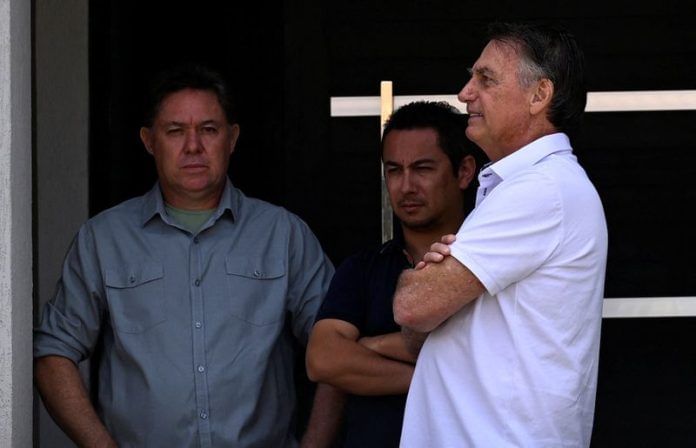By Ricardo Brito and Luciana Magalhaes
BRASILIA (Reuters) -The final phase of the landmark Supreme Court trial of Brazil’s former President Jair Bolsonaro on charges of plotting a coup began on Tuesday as the lead judge cast the case as a defense of democracy in the face of attacks by U.S. President Donald Trump.
As he opened the court session, Justice Alexandre de Moraes, whom the Trump administration has imposed sanctions on over the trial, said a “criminal organization” had tried to coerce the high court to submit to “the scrutiny of a foreign state.”
He said those efforts would not affect the court’s decision because “national sovereignty cannot, should not, and will never be vilified, negotiated or extorted.”
Trump has used the case as primary justification for imposing 50% tariffs on many Brazilian goods and canceling the U.S. visas of most Brazilian Supreme Court judges.
Bolsonaro’s son, congressman Eduardo Bolsonaro, moved to the U.S. in March to start a campaign in his father’s defense and has claimed credit for Trump’s retaliation against Brazil and Moraes. Both father and son are now under investigation in Brazil on suspicion of inviting Trump’s interference.
The final phase of the trial is expected to conclude by September 12. Bolsonaro has consistently maintained his innocence but also told Reuters in a July interview that he had given up hope of being acquitted.
“They want to convict me,” he said.
The former president remained in his home on Tuesday, where he has been confined for weeks under court orders.
Senator Damares Alves, a longtime friend of Bolsonaro and human rights minister in his cabinet, said she had visited him on Monday. She said the former president did not attend the trial because his lawyers were worried he would have a bout of hiccups, an increasingly frequent symptom of the health troubles he has developed since a 2018 stabbing.
“It would be an embarrassment because he really isn’t well,” she said on Tuesday. “It’s really an elderly man being tried, and a very sick one.”
Concerned that Bolsonaro may pose a flight risk, Moraes on Saturday ordered inspections of all vehicles leaving Bolsonaro’s residence and enhanced surveillance of the area. Police found a document last month suggesting he may have considered seeking political asylum in Argentina, an allegation that his lawyers deny.
Moraes has become a commanding symbol of the strengths and weaknesses of the institutions Bolsonaro has long attacked. While his supporters see him as a courageous defender of a young democracy, right-wing critics view his actions as politically motivated persecution.
Bolsonaro is an ideological and political ally of Trump and has been nicknamed “Trump of the Tropics” by the media for his populist, nationalist rhetoric and admiration for the U.S. leader.
Trump has said Bolsonaro is being targeted in a politically motivated “witch hunt” for his conservative views, echoing language Trump has used to describe legal cases against himself.
HISTORIC RECKONING
As with many high-profile cases before Brazil’s Supreme Court, the trial is being broadcast live, drawing millions of Brazilians to their TVs and phones to witness another dramatic chapter in the country’s deeply polarized political saga.
The last part of the trial caps a years-long investigation into the causes and context of the storming and defacing in 2023 of Brazil’s most iconic civic landmarks, such as the Congress and the Supreme Court, by thousands of Bolsonaro supporters protesting his electoral defeat, an episode with parallels to the 2021 riot at the U.S. Capitol by Trump supporters.
The trial of Bolsonaro, a former army captain, and several of his allies, including high-ranking military officials, could also mark a historic reckoning for a country that has never held its armed forces accountable for leading a violent and corrupt dictatorship from 1964 to 1985.
While the court could impose sentences totaling more than 40 years, Brazilian law typically allows convicts to be released well before serving their full terms.
Though the trial is expected to spark fresh demonstrations in the coming days, protests scheduled in Brasilia since Sunday have so far failed to attract many demonstrators.
Lawmakers aligned with Bolsonaro gathered at the Senate on Tuesday to again denounce the case.
“It’s political revenge,” said Senator Hamilton Mourao, who served as Bolsonaro’s vice president.
(Reporting by Ricardo Brito and Luciana Magalhaes; Editing by Manuela Andreoni, Sandra Maler, Alistair Bell and Cynthia Osterman)
Disclaimer: This report is auto generated from the Reuters news service. ThePrint holds no responsibility for its content.




